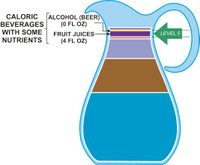Level 5

Fruit juices (100 percent juice) provide most of the nutrients of their natural source, but they are also relatively high in energy content and may lack fiber and other beneficial non-nutrient compounds present in the whole fruit. There is no specific need to consume fruit juices, and consumption of whole fruits should be encouraged for satiety and energy balance. The U.S. Dietary Guidelines Committee recommended that no more than one-third of the daily intake of fruits be in the form of juice. Fruit smoothies are usually high-calorie versions of fruit drinks and therefore are not recommended.
The Panel recommends only 0 to 8 ounces of 100% fruit juices daily.
Vegetable juices (e.g., tomato and multi-vegetable juices) are a healthy alternative but usually have significant amounts of added sodium. Whole tomatoes and vegetables are encouraged for satiety and energy balance rather than vegetable juices.
The Panel recommends only 0 to 8 ounces of 100% vegetable juices daily.
Whole (Full-Fat) Milk
Whole milk contains 236 kcal/12 fl. oz. and has higher energy density and saturated fat content than reduced-fat milk (2% fat, 180 kcal/12 fl. oz.), low-fat milk (1%, 150 kcal/12 fl. oz.), and skim or nonfat milk (135 kcal/12 fl. oz.). The adverse health effects of saturated fats have been well documented in numerous studies, especially with respect to the increased risk of cardiovascular diseases. Whole-fat dairy products are a significant source of saturated fat in the U.S. diet.
The Panel recommends no whole milk.
Sports Drinks
Sports drinks contain from 50 to 90 percent of the energy (75 to 140 kcal/12 fl. oz. [255 ml]) contained in calorically sweetened soft drinks (158 kcal/12 fl. oz.) and provide small amounts of sodium, chloride, and potassium. Although a well-balanced nutritious diet provides the same ingredients, the carbohydrates, water, and sodium in sports drinks are advantageous during endurance activities (i.e., when the sweat rate exceeds 8 liters per day, strenuous exercise lasts longer than 60 minutes, or a deficiency exists for sodium or carbohydrates). The Panel recommends that sports drinks be consumed sparingly except among endurance athletes because these beverages contain calories.
The Panel recommends low levels of sports drinks except for athletes, who may consume 0 to 16 fluid ounces daily.

Alcoholic beverages consumed in moderation have some health benefits for adults. While excessive alcohol (ethanol) consumption has been linked to serious health and social problems, moderate alcohol consumption has been associated with some health benefits. The relationship between alcohol consumption and mortality is often described as J-shaped, meaning that light to moderate consumption compared to abstention or high consumption is associated with lower rates of mortality—mostly from coronary heart disease and ischemic stroke—while heavy alcohol consumption is associated with higher rates of mortality from a number of causes. The benefits of moderate alcohol consumption which, in addition to cardiovascular health may include reduced risk of type 2 diabetes and gallstones, appear to be derived mainly from the alcohol itself. While short-term studies have shown beneficial effects of red wine on blood pressure, platelet aggregation, and serum lipids, epidemiological evidence does not support added health benefits specific to flavonoids in red wine or dark beer. Alcoholic beverages, even at moderate intakes, are linked with an increased risk of birth defects and breast cancer. The increased risk of breast cancer appears to be caused, at least in part, by the interference of alcohol with the absorption and metabolism of folate. Pregnant women should not drink alcoholic beverages and other women who consume alcohol should also consume adequate folate, preferentially from a supplement (400 mcg/day).
The Panel recommends 0 to 1 alcoholic beverage drinks per day for women and 0 to 2 per day for men (one drink = 12 fl. oz. of beer, 5 fl. oz. of wine, or 1.5 fl. oz. of distilled spirits).
Level 5: Calories in Alcoholic Beverages
| Beverage | Energy (kcal) | Amount (fl. oz.) |
| Beer | 140 | 12 (355mL) |
| Light Beer | 100 | 12 (355mL) |
| Wine Cooler | 110-275 | 12 (355mL) |
| Wine | 115 | 5 (148mL) |
| Spirits, 80 proof | 100 | 1.5 (44mL) |
| Standard Alcoholic Drink | 98 | 14 (414mL) |
| Soft Drink | 150 | 12 (355mL) |
Calories and Caffeine in Alcoholic Beverages
| Calories* | Caffeine (mg)** | |
| Alcoholic Drinks | ||
| Beer (Regular) 12 oz. | 209 | 0 |
| Beer Light (Bud Light) 12 oz. | 165 | 0 |
| Beer, Ale | 233 | 0 |
| Red Table Wine (3.5 oz.) | 11 | 0 |
| White Table Wine (3.5 oz.) | 105 | 0 |
| *Amount per 12 oz. (354.882ml) serving **Amount per 12 fl. oz. (335ml) serving |
Calories and Caffeine in Fruit, Vegetable Juices
| Calories* | Caffeine (mg)** | |
| Fruit Juices | ||
| Orange Juice (Minute Maid) | 165 | 0 |
| Tropicana Light & Healthy | 75 | 0 |
| Concord Grape Juice (Welch’s) | 255 | 0 |
| Apple Juice (Minute Maid) | 165 | 0 |
| Fruit Medley (Minute Maid) | 255 | 0 |
| Cranberry Juice Cocktail | 206 | 0 |
| Apple Juice (Unsweetened) | 168 | 0 |
| Vegetable Juices | 0 | 0 |
| V8 Vegetable Juice | 75 | 0 |
| Carrot Juice | 141 | 0 |
| *Amount per 12 oz. (354.882ml) serving **Amount per 12 fl. oz. (335ml) serving |

